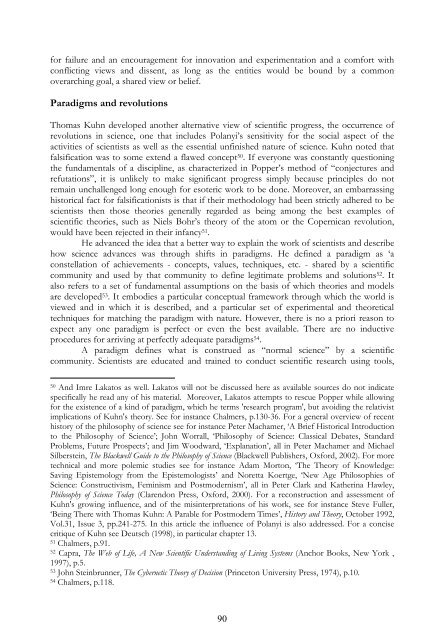Science, Strategy and War The Strategic Theory of ... - Boekje Pienter
Science, Strategy and War The Strategic Theory of ... - Boekje Pienter
Science, Strategy and War The Strategic Theory of ... - Boekje Pienter
Create successful ePaper yourself
Turn your PDF publications into a flip-book with our unique Google optimized e-Paper software.
for failure <strong>and</strong> an encouragement for innovation <strong>and</strong> experimentation <strong>and</strong> a comfort withconflicting views <strong>and</strong> dissent, as long as the entities would be bound by a commonoverarching goal, a shared view or belief.Paradigms <strong>and</strong> revolutionsThomas Kuhn developed another alternative view <strong>of</strong> scientific progress, the occurrence <strong>of</strong>revolutions in science, one that includes Polanyi’s sensitivity for the social aspect <strong>of</strong> theactivities <strong>of</strong> scientists as well as the essential unfinished nature <strong>of</strong> science. Kuhn noted thatfalsification was to some extend a flawed concept 50 . If everyone was constantly questioningthe fundamentals <strong>of</strong> a discipline, as characterized in Popper’s method <strong>of</strong> “conjectures <strong>and</strong>refutations”, it is unlikely to make significant progress simply because principles do notremain unchallenged long enough for esoteric work to be done. Moreover, an embarrassinghistorical fact for falsificationists is that if their methodology had been strictly adhered to bescientists then those theories generally regarded as being among the best examples <strong>of</strong>scientific theories, such as Niels Bohr’s theory <strong>of</strong> the atom or the Copernican revolution,would have been rejected in their infancy 51 .He advanced the idea that a better way to explain the work <strong>of</strong> scientists <strong>and</strong> describehow science advances was through shifts in paradigms. He defined a paradigm as ‘aconstellation <strong>of</strong> achievements - concepts, values, techniques, etc. - shared by a scientificcommunity <strong>and</strong> used by that community to define legitimate problems <strong>and</strong> solutions 52 . Italso refers to a set <strong>of</strong> fundamental assumptions on the basis <strong>of</strong> which theories <strong>and</strong> modelsare developed 53 . It embodies a particular conceptual framework through which the world isviewed <strong>and</strong> in which it is described, <strong>and</strong> a particular set <strong>of</strong> experimental <strong>and</strong> theoreticaltechniques for matching the paradigm with nature. However, there is no a priori reason toexpect any one paradigm is perfect or even the best available. <strong>The</strong>re are no inductiveprocedures for arriving at perfectly adequate paradigms 54 .A paradigm defines what is construed as “normal science” by a scientificcommunity. Scientists are educated <strong>and</strong> trained to conduct scientific research using tools,50 And Imre Lakatos as well. Lakatos will not be discussed here as available sources do not indicatespecifically he read any <strong>of</strong> his material. Moreover, Lakatos attempts to rescue Popper while allowingfor the existence <strong>of</strong> a kind <strong>of</strong> paradigm, which he terms 'research program', but avoiding the relativistimplications <strong>of</strong> Kuhn's theory. See for instance Chalmers, p.130-36. For a general overview <strong>of</strong> recenthistory <strong>of</strong> the philosophy <strong>of</strong> science see for instance Peter Machamer, ‘A Brief Historical Introductionto the Philosophy <strong>of</strong> <strong>Science</strong>’; John Worrall, ‘Philosophy <strong>of</strong> <strong>Science</strong>: Classical Debates, St<strong>and</strong>ardProblems, Future Prospects’; <strong>and</strong> Jim Woodward, ‘Explanation’, all in Peter Machamer <strong>and</strong> MichaelSilberstein, <strong>The</strong> Blackwell Guide to the Philosophy <strong>of</strong> <strong>Science</strong> (Blackwell Publishers, Oxford, 2002). For moretechnical <strong>and</strong> more polemic studies see for instance Adam Morton, ‘<strong>The</strong> <strong>The</strong>ory <strong>of</strong> Knowledge:Saving Epistemology from the Epistemologists’ <strong>and</strong> Noretta Koertge, ‘New Age Philosophies <strong>of</strong><strong>Science</strong>: Constructivism, Feminism <strong>and</strong> Postmodernism’, all in Peter Clark <strong>and</strong> Katherina Hawley,Philosophy <strong>of</strong> <strong>Science</strong> Today (Clarendon Press, Oxford, 2000). For a reconstruction <strong>and</strong> assessment <strong>of</strong>Kuhn's growing influence, <strong>and</strong> <strong>of</strong> the misinterpretations <strong>of</strong> his work, see for instance Steve Fuller,‘Being <strong>The</strong>re with Thomas Kuhn: A Parable for Postmodern Times’, History <strong>and</strong> <strong>The</strong>ory, October 1992,Vol.31, Issue 3, pp.241-275. In this article the influence <strong>of</strong> Polanyi is also addressed. For a concisecritique <strong>of</strong> Kuhn see Deutsch (1998), in particular chapter 13.51 Chalmers, p.91.52 Capra, <strong>The</strong> Web <strong>of</strong> Life, A New Scientific Underst<strong>and</strong>ing <strong>of</strong> Living Systems (Anchor Books, New York ,1997), p.5.53 John Steinbrunner, <strong>The</strong> Cybernetic <strong>The</strong>ory <strong>of</strong> Decision (Princeton University Press, 1974), p.10.54 Chalmers, p.118.90
















